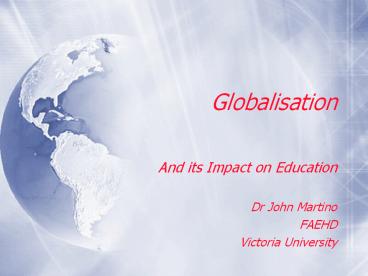Globalisation - PowerPoint PPT Presentation
Title:
Globalisation
Description:
Globalisation And its Impact on Education Dr John Martino FAEHD Victoria University Globalisation Globalisation may be thought of initially as the widening, deepening ... – PowerPoint PPT presentation
Number of Views:431
Avg rating:3.0/5.0
Title: Globalisation
1
Globalisation
- And its Impact on Education
- Dr John Martino
- FAEHD
- Victoria University
2
Globalisation
- Globalisation may be thought of initially as the
widening, deepening and speeding up of worldwide
interconnectedness in all aspects of contemporary
social life, from the cultural to the criminal,
the financial to the spiritual (Held et al.
19992 emphasis added). - Held, D. et al. 1999, Global Transformations
Politics, Economics and Culture, Polity,
Cambridge.
3
Alternative Views
- For some observers, globalisation is a process of
fundamental transformation, leading humanity into
a new epoch, which coincides with the start of
the third millennium.
4
Alternative Views
- For others globalisation is much more limited,
referring mainly to issues of trade and
investment, and containing little which is
qualitatively new.
5
Alternative Views
- For some, globalisation offers huge opportunities
for economic growth and improved living
standards. - Other commentators argue that globalisation
erodes the autonomy of the nation-state, removing
its ability to protect its citizens by means of
economic management and welfare policies.
6
Held provides a more precise definition of
globalisation as
- A process (or set of processes) which embodies a
transformation in the spatial organisation of
social relations and transactions assessed in
terms of their extensity, intensity, velocity and
impact generating transcontinental or
interregional flows and networks of activity,
interaction, and the exercise of power (Held et
al. 199916).
7
Approaches to Globalisation
- Approaches to globalisation can be roughly
divided into three broad categories - hyperglobalisers,
- sceptics and
- transformationalists.
8
Hyperglobalisers
- Positive hyperglobalisers see the new centruy as
opening up opportunities to become interconnected
at a world scale. - This view emphasises an ever-increasing
cross-border flows of capital, commodities,
people and ideas are a defining factor of the new
age.
9
Hyperglobalisers
- The World Bank other international agencies are
hyperglobalisers
10
Hyperglobalisers
- Negative hyperglobalist views can be found in the
critical and neo-marxist literature. In the
recent bestseller, The Global Trap, the starting
point is the explosion of global media, and the
burgeoning of global mobility.
11
Negative Hyperglobalist View
- Globalisation is the mechanism for the rule of
international investors and transnational
corporations, who can no longer be controlled by
ever-weaker nation-states. - Trade unions and welfare systems are collapsing.
Unemployment and social exclusion are burgeoning,
while uncontrolled growth is leading to
life-threatening environmental degradation. - Thus globalisation can lead to social
fragmentation, cultural uncertainty, conflict and
violence.
12
The Sceptics
- Focus mainly on the economic aspects of
globalisation - They acknowledge the high levels of cross-border
flows of trade, investment and labour, but argue
that there is nothing new about this
international economic integration in the period
preceding the First World War was comparable with
current levels.
13
The Sceptics
- The sceptics also argue that the role of the
nation-state remains as strong as ever. This
applies especially to the USA, Japan and Western
Europe, which are now at the centre of the three
dominant economic blocs the European Union (EU),
the North American Free Trade Area (NAFTA) and
the more loosely-integrated East Asian region.
14
Transformationalists
- Argue that globalisation is the central driving
force behind the major economic, cultural, social
and political changes that are affecting
virtually all the world?s people today.
Globalisation is seen as the overall consequence
of closely interlinked processes of change in the
areas of technology, economic activity,
governance, communication and so on.
15
Transformationalists
- Developments in all these areas are mutually
reinforcing or reflexive, so that no clear
distinction can be drawn between cause and
effect. Transformationalists regard contemporary
patterns of cross-border flows (of trade,
investment, migrants, cultural artefacts,
environmental factors, etc.) as without
historical precedent. - Such flows integrate virtually all countries into
a larger global system, and thus bring about
major social transformations at all levels.































